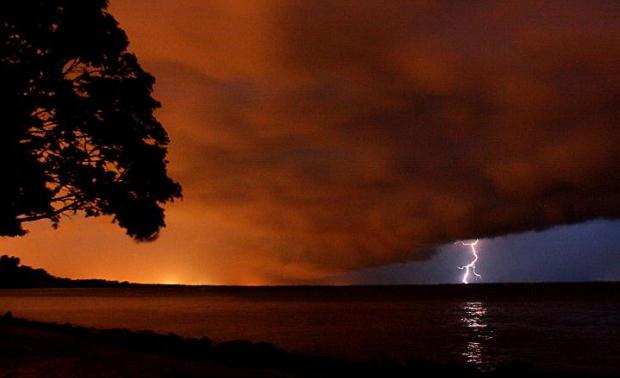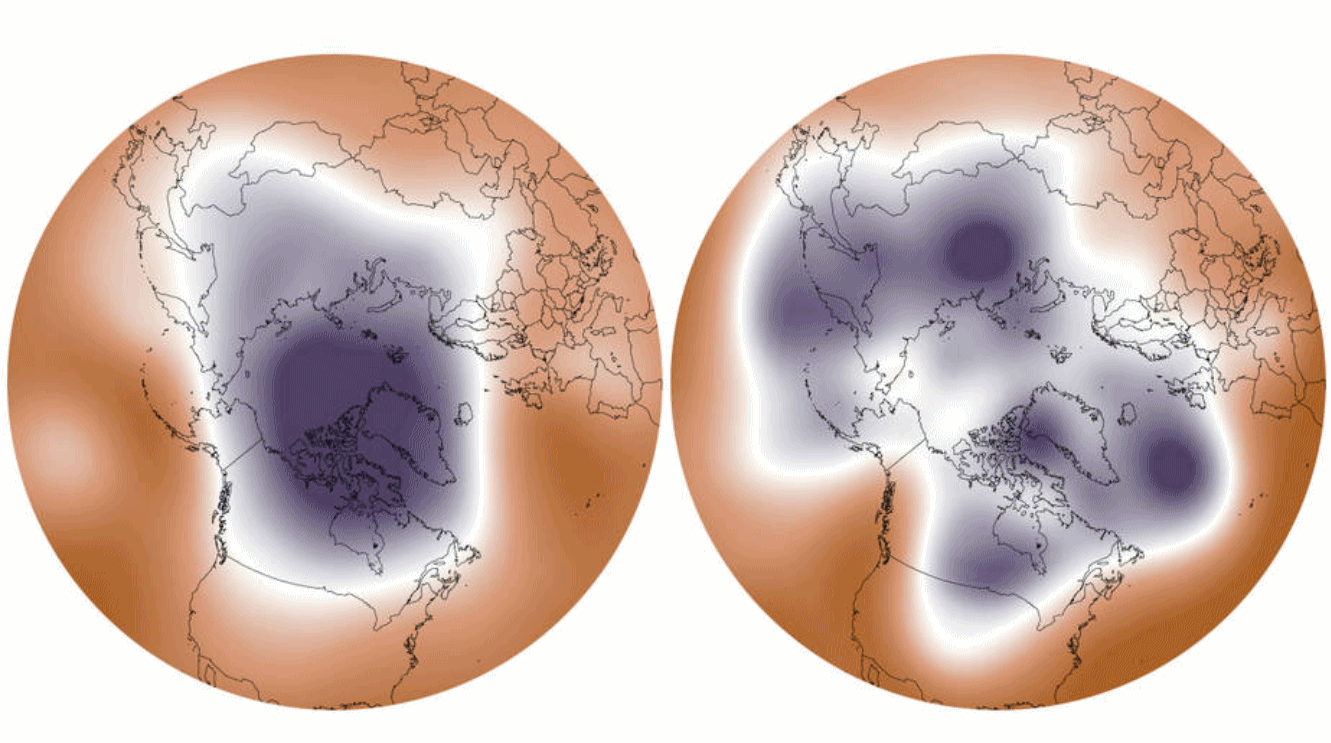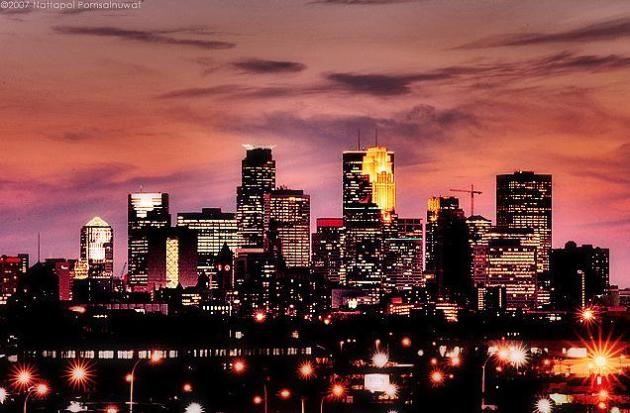75 F. maximum temperature yesterday in the Twin Cities.
66 F. average high on September 28.
62 F. high on September 28, 2016.
September 29, 1876: An abnormally cool day occurs, with a high of 45 in the Twin Cities (normally the high should be 65 this time of year).
Sunday Rain - Record Setting Month for Hurricanes
Residents of Puerto Rico continue to suffer through the aftermath of Maria: no power, few cell towers, limited food, water and medicine, and a growing sense of dread among survivors. The risk of infection, disease, even cholera and malaria, is off the scale.
September may have been the most violent month for hurricanes in the Atlantic on record. Irma, Katia, Jose, Lee and Maria set a record for the most hurricane energy of any month, according to researchers.
September '17 may wind up as the costliest month too, exceeding $211 billion in damage from Katrina, Rita & Wilma in 2005. And hurricane season won't wind down until November.
A northeast breeze cools us off a a bit today. Plan outdoor activities for Saturday, especially early. Showers arrive late tomorrow, with heavier, steadier rain on Sunday. I'm just the messenger.
Models show a series of showery clippers next week with highs in the 60s - maybe a first frost by the third week of October?
Tampico, Mexico saw a real-life "fishnado"; a shower of fish, probably associated with a waterspout. Check out the blog!
Warm, Wet Bias Into First Week of October.
A cold trough of pressure will bring a slap of chilly air into the
northwestern third of the USA, but most of the nation east of the
Rockies will experience a warm bias over the next 10 days; drier for New
England, but wetter for most of the nation, based on NOAA guidance.
The Data That Prove Bad Weather Alters Your Mood. Quartz breaks down some new research: "...Meteorological
data considered included daily maximum temperature, temperature range,
precipitation measures, cloud cover, and relative-humidity statistics,
all measures considered central to the relationship between weather and
emotional states in previous, smaller studies. The researchers write
that they were able to find “substantial evidence that less ideal
weather conditions relate to worsened sentiment.” Specifically, they
noted that cold temperatures, hot temperatures, precipitation, narrower
daily temperature ranges offering little shift from steadily unpleasant
conditions, humidity, and cloud cover were all associated with worsened
expressions of sentiment, even when excluding weather-related posts..."
Puerto Rico's Looming Medical Crisis is "About to Explode". CNN explains: "...The
desperation that all these people have, they've lost everything -- on
the whole island," she says. With the fuel and power shortages, she
expects the No. 1 health concern in the days ahead will be infectious
diseases. As people who need medications do not get them, she predicts
mental health issues will become a problem as well. "It will get worse
before it gets better," she says. Her feelings are shared by other
health care providers on the island, who believe a medical crisis is
about to unfold. But it isn't inevitable, since preventive steps can be
taken now. That's the opinion of Dr. Robert Fuller, an emergency
medicine physician at University of Connecticut and International
Medical Corps..."
Puerto Rico's Grid Needs a Complete Overhaul. CityLab has the story; here's an excerpt: "...Even before this most recent storm, Puerto Rico’s energy infrastructure was precarious. “It was already unsustainable; it was a terrible mess,” says Judith Enck, the former EPA administrator for Region 2, which includes Puerto Rico and the U.S. Virgin Islands. “Even if you had a modest wind storm, people would typically lose power for days at a time.” Enck identifies dual culprits: power plants that required fossil fuels, and “rickety old transmissions.” Puerto Rico’s existing energy infrastructure relied primarily on oil or coal. And despite unreliable and unsustainable power sources, she adds, residents were paying some of the highest utility rates in the country..."
Hurricane-Ravaged Barbuda and Dominica Must "Build Back Better". Reuters explains: "...In
the case of Barbuda an “island that has to be built from scratch”
getting urban planning right is vital to limit the potential of damage
of future hurricanes, Faieta said. This includes building shelters and
storage areas for food, water and seeds in safe locations, away from
flood-prone areas on high-ground, she said. Improving early warning
systems is also important, she said. This includes providing communities
with cellphone technology to tell people where to pre-position food and
seeds ahead of a hurricane and mapping flood-plain areas. In Dominica, a
mountainous island, reforestation will be also important to lessen the
hazard of landslides triggered by heavy rains..."
It's Not Just Puerto Rico: 6 Other Caribbean Island Nations Are In Crisis After the Hurricanes. Vox has the story: "...Irma and Maria collapsed the infrastructure, electricity, and communications lines of the British Virgin Islands: The
British Virgin Islands were beaten by both Hurricanes Irma and Maria
(though Maria caused less damage than some feared). Still, the collapsed
infrastructure and knocked out electricity and communications lines were enough to inspire Virgin Group founder Richard Branson to call for a Marshall Plan to help rebuild the British territory. (His own private island, Necker, was not spared by the storms.) “These hurricanes are causing unimaginable destruction,” Branson wrote on his website.
A third of Dutch St. Martin’s buildings were ruined: The Island of St.
Martin, which is split into two sides overseen by French and Dutch
control, was also walloped by Irma. A third of the buildings on the
Dutch side of the island were destroyed, and 90 percent were damaged,
according to Reuters. So far, more than a dozen people died as a result of the storm, with hundreds registered as missing..."

Primal Screams, Blood and Burns: What Its Like to Survive a Lightning Strike. Here's a clip from a jaw-dropping account at The Washington Post: "...We were struck at the lakeside, each of us channeling various amounts of the bolt that hit the tree at our back, and me and Aidan in head behind our left ears, passing through and across our bodies, until it made explosive contact with the ground,” Lovera later recounted on Facebook. “I have never been more proud of my children, who despite severe burns, punctured eardrums, and much blood, in semiconsciousness, dragged themselves to safety,” Lovera wrote earlier this month. “Aidan's screaming brought me to consciousness, disoriented at seeing the blood clotted on the left of his head, and the blood and burns than ran down my body, and the trauma of seeing Nadia facedown up the hill from me, all of us in severe shock. My clothes had been shredded, burned and fused to parts of my body, and I could not move as I lay on my back...”
File photo: Brad Birkholz.
Freeze-Free Season in the Twin Cities. Some of this is urban heat island, some of it is the background warming we're seeing (everywhere). NOAA explains: "The
freeze-free season (growing season), lengthened by 16 days from
1951-2012. Most of this change has been due to an earlier end date of
the freezing season (an earlier spring thaw). In most other parts of the
Great Lakes region, the length of the freeze-free season is tied
closely to the number of days below freezing. Through the late-80s and
early-90s, this was not necessarily the case for Saint Paul, as the
freeze-free period increased steadily despite winters with more cold
days."
Graphic credit: "The
green line represents the 9-year moving average of length of the time
between the last freeze of spring and the first freeze of fall, theh
freeze-free period. The shaded band represents the standard deviation."
2016: A Twin Cities Growing Season Like No Other (on record). Here's an excerpt from the Minnesota State Climatology Office: "In
2016 the Twin Cities observed its longest frost-free season on record,
tallying 219 consecutive days without a 32 degree F reading at the MSP
airport. The first such reading of the 2016 fall was also by far the
latest on record, and did not come until November 18th--11 days later
than the old record of November 7, set in 1900. The Twin Cities
"threaded" record for these purposes extends back to 1873.
Historically, roughly 90% of autumn seasons produce a 32 degree F
reading in the Twin Cities by October 28, and the first freezing reading
has occurred in November just eight times (including 2016). Although
the autumn season has warmed rapidly in the last several decades, all of
the other November first-freeze dates were in the 20th and 19th
centuries, with the most recent one on November 6, 1958..."
Zero Emission Buses That Use No Fuel are Coming to Minnesota. GoMN has the news: "Buses
with no tailpipes are on their way to the Twin Cities. Well, they're
not literally on their way because they haven't been built yet. But Metro Transit says
a new rapid bus route that starts running in a couple years will use
six brand new battery-electric vehicles. And these aren't hybrid buses –
they'll use no fuel at all. The zero-emission buses will be built in
St. Cloud by New Flyer,
which says it's North America's biggest maker of public transit buses.
For 15 years Metro Transit's fleet has included hybrid buses that are
powered by both diesel fuel and electricity. They've now got 134 of
those. But the agency says the new buses just ordered from New Flyer
will be their first that don't use fuel..."
Image credit: New Flyer
Minnesota Public Hearing Begin for Enbridge's $6.5 Billion Oil Pipe Expansion. Reuters has an update: "...The
bulk of the line’s U.S. portion passes through Minnesota, the last
jurisdiction to review it. A decision to not grant permission would bar
work for construction in state, although the company can appeal, and the
current line remains operational. Enbridge spokesman Michael Barnes
said: “We are eager for the hearings to get under way and the facts to
be presented. This will be a detailed process, which will show the need
for the replacement project.” In a surprise move this month, Minnesota’s
Department of Commerce opposed the upgrade, saying refineries in the
state and the upper Midwest “are not short of physical supplies of crude
oil, and that they have little room to increase total crude runs...”
File photo: "Pipelines
run to Enbridge Inc.'s crude oil storage tanks at their tank farm in
Cushing, Oklahoma, March 24, 2016. Picture taken March 24, 2016." REUTERS/Nick Oxford.
Work and the Loneliness Epidemic. Harvard Business Review has a must-read article: "...There
is good reason to be concerned about social connection in our current
world. Loneliness is a growing health epidemic. We live in the most
technologically connected age in the history of civilization, yet rates
of loneliness have doubled since the 1980s. Today, over 40% of adults in America
report feeling lonely, and research suggests that the real number may
well be higher. Additionally, the number of people who report having a
close confidante in their lives has been declining over the past few
decades. In the workplace, many employees — and half of CEOs — report feeling lonely in their roles..."
10 Alarming Triggers for Alzheimer's Disease. ActiveBeat takes a look at some of possible precursors: "Danish
researchers found a link between Alzheimer’s and rosacea, the chronic
inflammatory skin disorder in elderly patients. Rosacea produces higher
levels of matrix metalloproteinases and antimicrobial peptide proteins
that are responsible for brain-wasting disorders. The study printed in
the Annals of Neurology concluded that patients with Rosacea had a 7%
higher risk of Alzheimer’s. Out of those people, women with rosacea were
28% more likely to develop Alzheimer’s, where men were only 16% more
likely to develop Alzheimer’s..."
Cancer Warnings on Coffee May Be Coming to California. Food & Wine has the story: "Americans
drink a lot of coffee: With one estimate saying the average coffee
consumer slugs back about three cups per day. The good news is that, in
general, science says all that joe is good for us. Recent studies have
shown that coffee can cut mortality rates (multiple studies actually), reduce the risk of Multiple Sclerosis and benefit your liver. But no beverage is perfect (even too much water can kill you), and coffee producers openly admit that roasted beans contain acrylamide—a naturally occurring chemical that is also designated by the World Health Organization as "probably carcinogenic to humans..."
B.o.B. Has Technically Already Raised Enough Money to Prove the Earth Isn't Flat. There are no words. Gizmodo reports: "Hip-hop star B.o.B., who last year started a minor feud with astrophysicist Neil deGrasse Tyson over the extremely resolved question of whether the Earth is flat (it is not), apparently does not consider the matter settled. Last week, B.o.B. created a GoFundMe page
to prove to him that the world is, in fact, curved. His plan? “I would
like to send one, if not multiple satellites as far into space as I can
or into orbit as I can to find the curve,” B.o.B. said in a promotional
video for the campaign on Monday. “I’m really ... I’m looking for the
curve...”
In Our Troubled World, Disaster Movies Are Becoming Obsolete. The Guardian explains: "...A
troubled world doesn’t lead necessarily to a hunger for escapism in our
entertainment. Quite the contrary. If the prospect of a dystopian or
unjust reality quenched our need to see it reflected and analysed, then
the recent TV adaptation of The Handmaid’s Tale wouldn’t have found the acclaim or the audience that it did, and the racially charged horror movie Get Out
would not already be one of the highest-grossing films of the year.
It’s a truism that great art flourishes under hostile environments and
administrations. But if the future appeal of worst-case scenarios such
as Sharknado or Independence Day looks in doubt, then the beneficiaries
will be those film-makers driven to ask why exactly our world is so
messed up rather than imagining how much worse it could be."
Image credit: "Sharknado 4. ‘Sharknado may have knowingly pushed the idea of natural catastrophe into absurdity. But only just." Photograph: Supplied.
Fishnado. Rain in Tampico, Mexico Included Small Fish. It's true, I read it on the Interweb. Here's an excerpt of a story at sciencespacerobots.com: "Northeastern
Mexico received small fish as precipitation on Tuesday. The fish fell
from the sky along with a light rain in the coastal city of Tampico.
Tampico is port city located in the Mexican state of Tamaulipas on the
western Gulf of Mexico. Evidence of the fish rain was posted on Facebook
by the Protección Civil Tamaulipas. They call it a curious case of
small fishing falling from the sky with a light rain. It shows a tiny
fish that fell on a sidewalk and a bag with four other specimens. Mexico
has experienced a couple large earthquakes lately but these are not
related to the fish event. The cause is thought to have been a
waterspout. A CBC story
notes that there have been stories throughout human history of fish and
other animals falling from the sky. It says scientists believe
waterspouts can suck fish out of the water and then deposit them on the
coast..."
“We make a living by what we get. We make a life by what we give.” – Winston Churchill

TODAY: Partly sunny and cool. Winds: NE 5-10. High: 65
FRIDAY NIGHT: Clear to partly cloudy. Low: 47
SATURDAY: Sunny start, then increasing clouds. A few showers late. Winds: SE 10-15. High: 68
SUNDAY: Cool and damp. Heavier, steadier rain. Winds: SE 10-20. Wake-up: 56. High: 63
MONDAY: Front stalls. Showers, few T-storms. Winds: S 10-15. Wake-up: 57. High: 68
TUESDAY: Showers begin to taper off a bit. Winds: SW 8-13. Wake-up: 58. High: 69
WEDNESDAY: Drying out with peeks of cool sun. Winds: NW 10-15. Wake-up: 53. High: 66
THURSDAY: Bright sun, best day in sight. Winds: W 5-10. Wake-up: 52. High: near 70
SATURDAY: Sunny start, then increasing clouds. A few showers late. Winds: SE 10-15. High: 68
SUNDAY: Cool and damp. Heavier, steadier rain. Winds: SE 10-20. Wake-up: 56. High: 63
MONDAY: Front stalls. Showers, few T-storms. Winds: S 10-15. Wake-up: 57. High: 68
TUESDAY: Showers begin to taper off a bit. Winds: SW 8-13. Wake-up: 58. High: 69
WEDNESDAY: Drying out with peeks of cool sun. Winds: NW 10-15. Wake-up: 53. High: 66
THURSDAY: Bright sun, best day in sight. Winds: W 5-10. Wake-up: 52. High: near 70
Climate Stories...

Big Climate Change Price Tag for US: Climate Nexus reports: "Extreme
weather and public health issues related to burning fossil fuels could
cost the United States up to $360 billion annually--nearly half of
annual US economic growth--within the next ten years, according to a new
report.
The report from the non-profit Universal Ecological Fund found that the
impacts of wildfires, hurricanes, heat waves and other extreme weather
amplified by climate change, combined with air pollution, cost the
United States $240 billion per year since 2007. The report comes as the
US tallies up the price tag for Hurricanes Harvey, Irma and Maria, which
are estimated to cost $300 billion in damages, or twice the cost of all
hurricane damages within the past decade." (Bloomberg, Reuters, National Geographic)
Hurricane Maria May Be a Preview of Climate-Fueled Migration in America. Bloomberg has the story: "...Researchers at the International Monetary Fund,
in a report released Wednesday, looked at the links between extreme
weather and emigration in more than 100 countries over three decades.
They found that "a rise in temperature and greater incidence of
weather-related disasters increase out-migration," according to Petia
Topalova, the IMF researcher and lead author of the report. It describes
migration as an "adaptation strategy for households hurt by weather
shocks" and predicts that "substantial migration flows, potentially
spilling across country borders, could arise if climate change causes a
significant rise in sea levels..."

Ice Loss and the Polar Vortex: How a Warming Arctic Fuels Cold Snaps. Counterintuitive? You 'betcha! Here's an excerpt of an explainer at InsideClimate News: "...The
polar vortex has always varied in strength, but the study found that
the weaker phases are lasting longer and coinciding with cold winters in
Northern Europe and Russia. "The shift toward
more persistent weaker states of the polar vortex lets Arctic air spill
out and threaten Russia and Europe with extreme cold," said the
study's lead author, Marlene Kretschmer, a climate scientist with the
Potsdam Institute for Climate Impact Research. "The trend can explain most of the cooling of Eurasian winters since 1990."
Some other scientists aren't as sure that melting sea ice affects the
polar vortex so strongly. They think other factors, like long-term
variations in sea surface temperatures like El Niño, and changes in the
tropics, might play bigger roles..."
Map credit: "A
strong polar vortex (left, from December 2013) is centered over the
Arctic. A weakened polar vortex (right, from January 2014) allows cold
air to dip farther south." Credit: NOAA
Late-September Heat Wave Leaves Climate Experts Stunned. Here's an excerpt from a ThinkProgress story that caught my eye: "...There
has never been a heat wave of this duration and magnitude this late in
the season in Chicago,” the National Weather Service reported
Tuesday evening. From Wednesday through Tuesday, for example, Chicago
sweltered through “the only occurrence on record of 7+ consecutive
90°[F] days entirely within September.” Every day of the heatwave was
92°F or above, and every one set a new record high for that date...Back
in the United States, the current heat wave has set records across the
Midwest and East. On Monday, 92ºF was the hottest Burlington, Vermont
had ever been that late in the year — by a full seven degrees, the
Washington Post reported.
On Sunday and Monday, Buffalo, New York saw its latest-ever consecutive
90ºF days. Records for hottest day or hottest series of days this late
in the year were crushed in Minneapolis; northern Maine; Ottawa, Canada;
and Green Bay, Wisconsin..."
Map credit: "Places where temperatures are projected to be within one degree of a record high Wednesday." CREDIT: National Weather Service via WashPost/WeatherBell.com.
Europe's Hot, Fiery Summer Linked to Global Warming, Study Shows. InsideClimate News connects the dots: "Global warming made this summer's record heat across Southern Europe—with its wildfires and a heat wave so vicious it was nicknamed "Lucifer"—10 times more likely than it would have been in the early 1900s, scientists said today in a study published by the World Weather Attribution
research group. If greenhouse gas emissions aren't cut soon, such heat
waves will be the regional summer norm by 2050, the study concluded. The
scientists, from universities and research institutions in Europe and
the United States, said they are more certain than ever that
human-caused global warming is a key driver of the extreme heat. As the
average global temperature goes up, it becomes easier to pick out the
climate change signal, said lead author Sarah Kew, a climate researcher
with the Royal Netherlands Meteorological Institute..."

- Seattle, Washington
- Philadelphia, Pennsylvania
- Austin, Texas
- Phoenix, Arizona
- Baltimore, Maryland
- Portland, Oregon
- San Francisco, California
- Minneapolis, Minnesota
- Ann Arbor, Michigan
- Madison, Wisconsin
- Chicago, Illinois..."
No comments:
Post a Comment